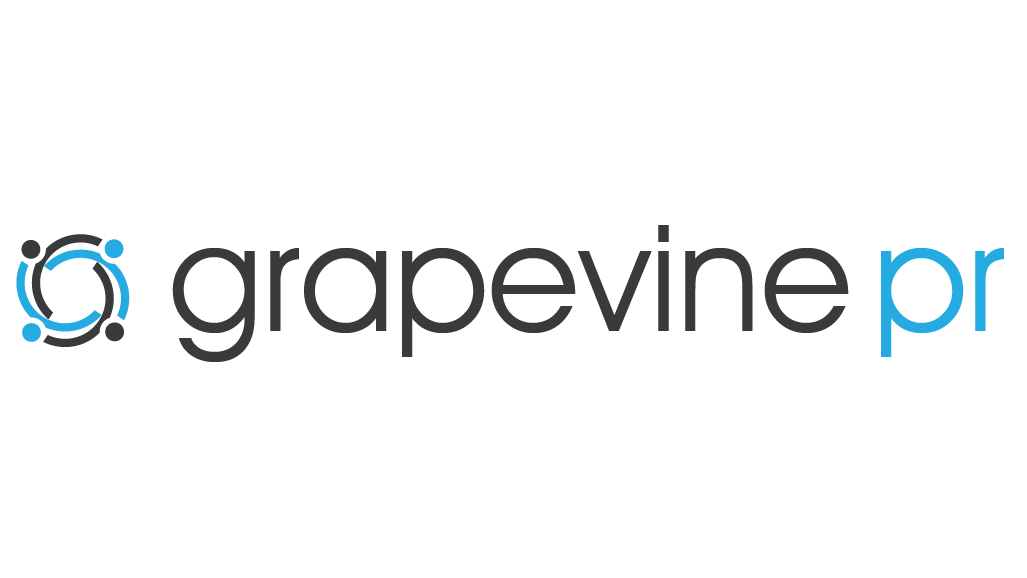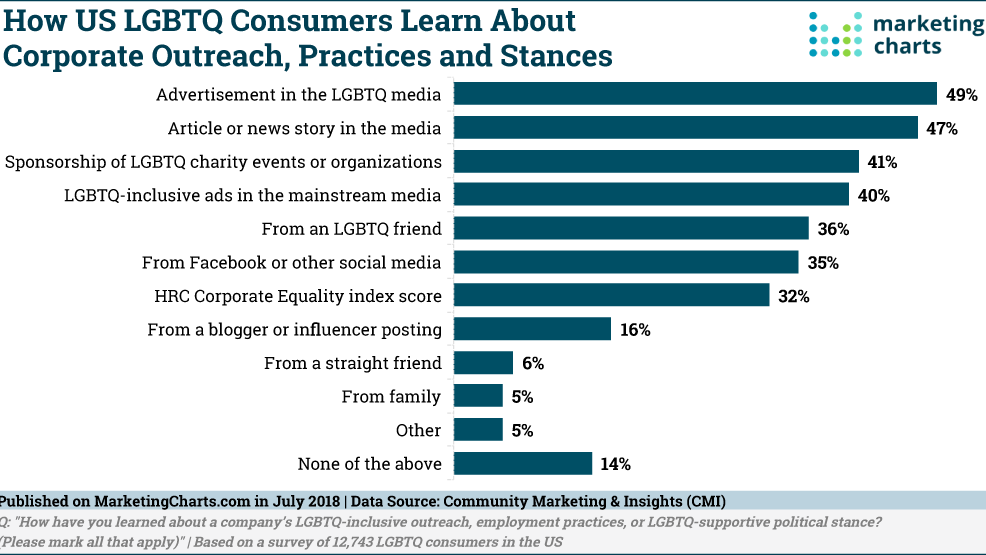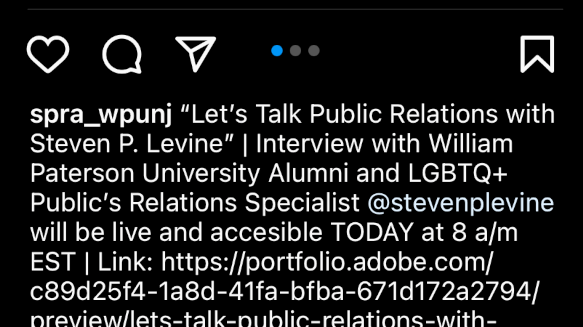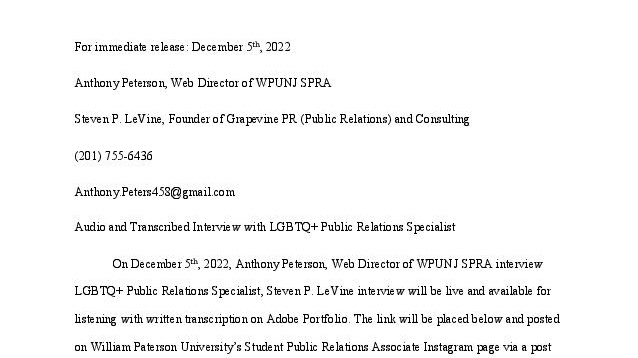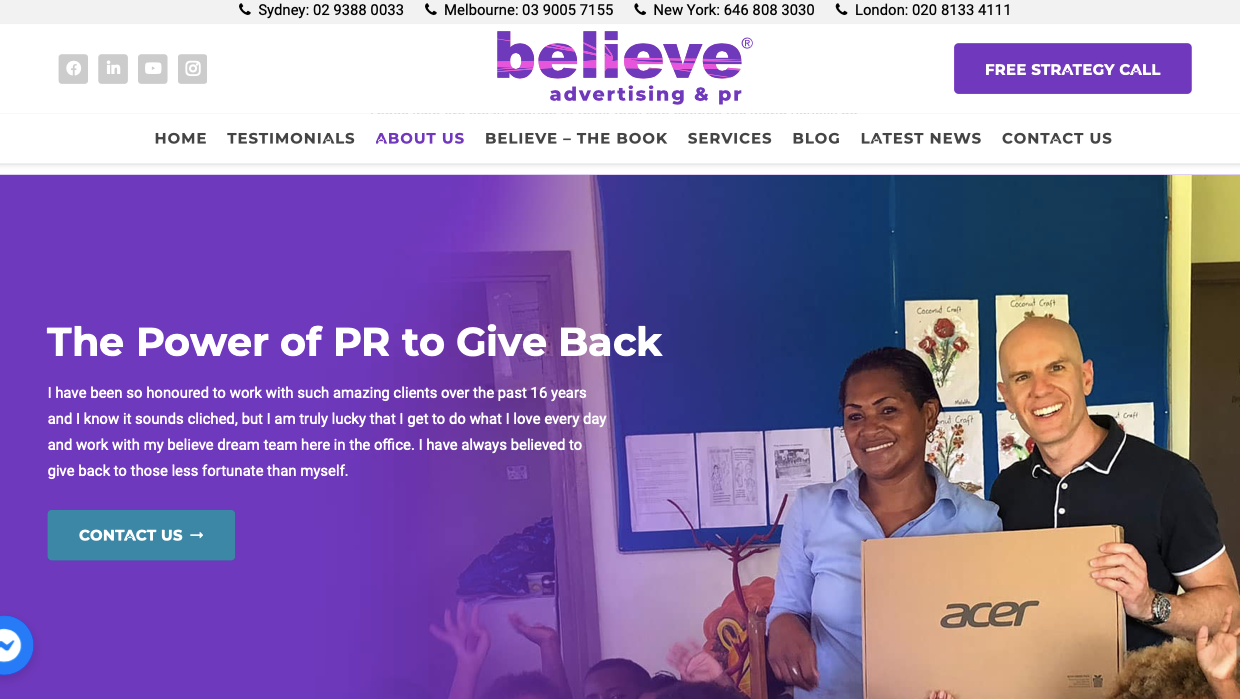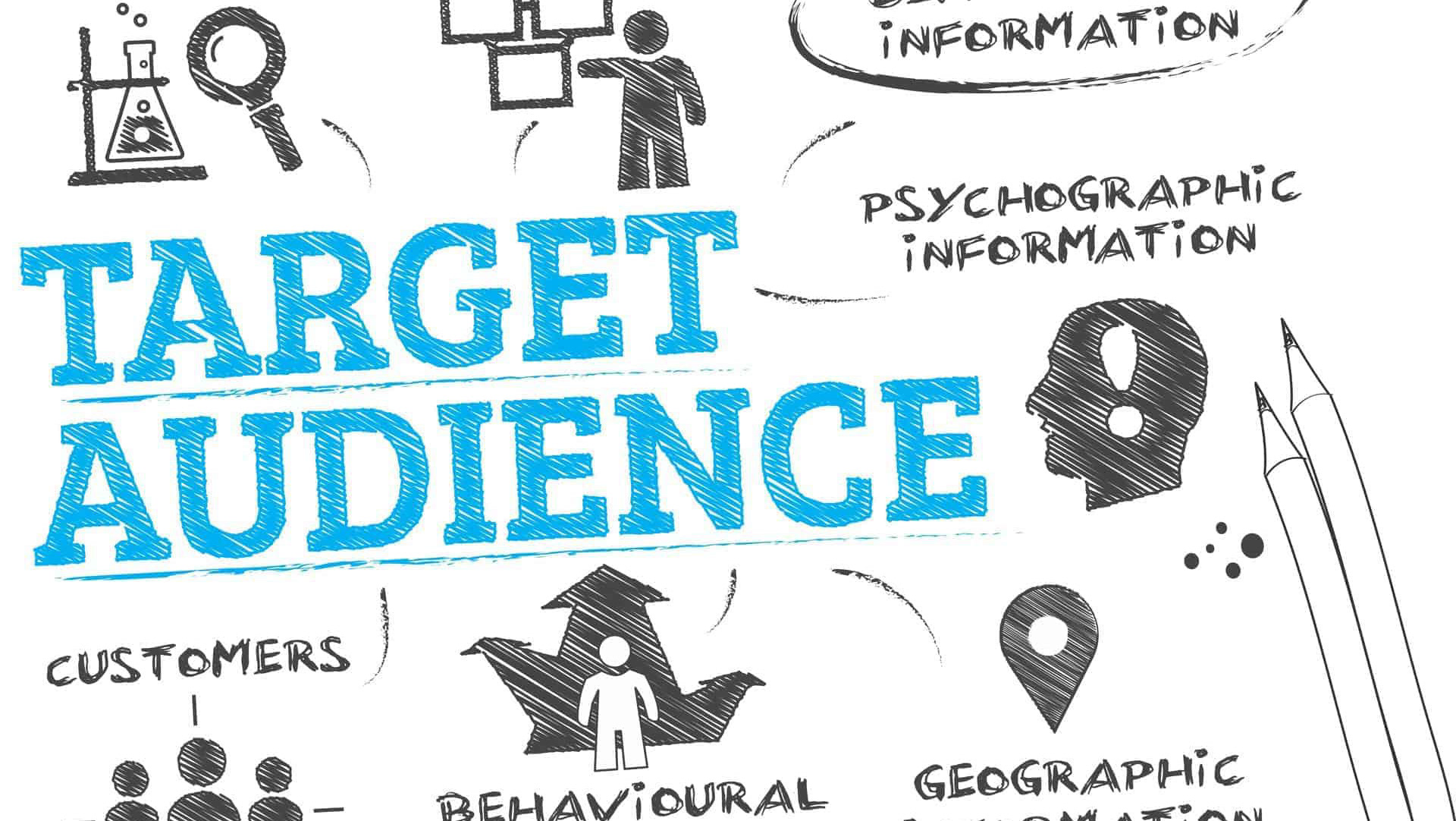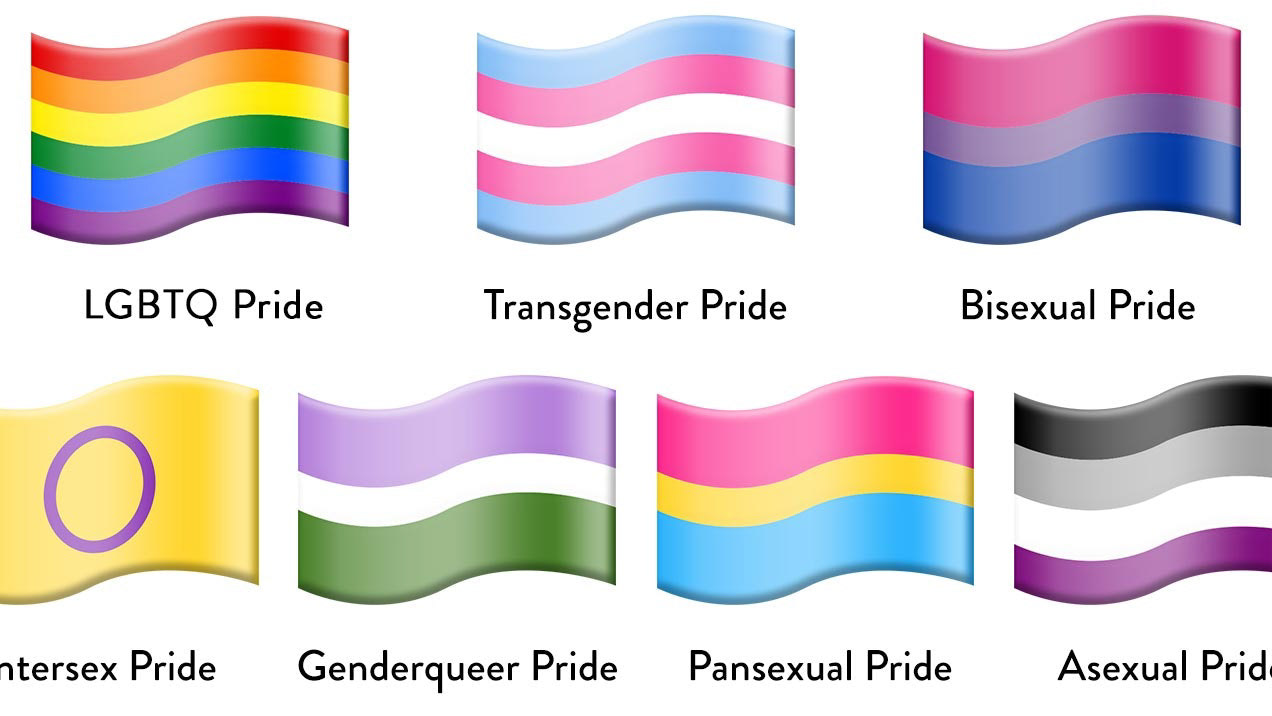Below is the audio and transcribed interview with William Paterson University Alumni, LGBTQ+ Public Relations Specialist, Founder of Grapevine PR, Entrepreneur, and Author, Steven P. LeVine
Transcription of Interview
A. Peterson [00:00:04] Hello. Good evening, Steven. Thank you for taking the time out for this interview. Before we start, can you provide the viewers with some background about yourself? Where you're from? Where do you currently reside? What do you do for work and extracurricular activities?
S. LeVine [00:00:17] Yeah, so I live in Austin, Texas. I'm originally from New Jersey and lived in L.A. for 13 years. And I am the founder of a PR company called Grapevine PR that I started in 2006. The focus is mainly on those in tech celebrities and entertainment experts like speakers, authors, coaches, and consumer brands. B2B and B2C. And I guess in terms of outside of business, I love to travel. I love music. I love I really those are my and trying new foods and that kind of thing. I think. Yeah, I think that's a good summation of everything.
A. Peterson [00:01:09] That's awesome. I'm a foodie too, so we definitely need to share some great places we visited.
S. LeVine [00:01:14] Awesome. Yeah, definitely.
A. Peterson [00:01:17] So my second question would be, since you are from New Jersey, where you attend college. How was your experience? Did it help you structure your professional endeavors post-graduation?
S. LeVine [00:01:27] Yeah, I went to William Paterson, and I had an amazing experience. I really learned a lot, especially in my chosen profession of PR from Professor Brown. She was my professor, and she really made a big difference with how much I was able to, you know, how much of education of and on the subject of public relations. I was able to accumulate or acquire and how much like applicable or applicable experience I was able to get rather than just the fundamentals of PR. I really like we got to really do exercises that kind of give me a real-world understanding of what's, you know, what PR really entails. So I had an amazing experience at William Paterson, and incredible experience under Professor Brown. And I think kind of going back to what I said about learning about PR from Professor Brown was that we were doing real-world exercises, crafting media pitches, crafting press releases, coming up with really interesting ideas for PR campaigns, learning from learning from her what she experienced in the world of PR. I'll never forget, you know, a lot of the stories that that she told us about what it was like to work in, you know, I think it was for Ogilvy PR and that just kind of really made it real for me. So when I when I left college, I felt like I had a really good understanding of what PR is really about and how to apply it. And it wasn't much long after that that I started my own company and I credit that towards you know, I credit Professor Brown and William Paterson and the communications department for leading me there.
A. Peterson [00:03:23] No, definitely. I love hearing that because I have two currently as my graduating director and when I tell you she's been the really good inspiration and good guidance that can connect you with the right resources for you to find your avenue in PR. So, hearing that is very encouraging. She is definitely a favorable presence on the faculty and she definitely does take her time with the students and really tries to invest in us. So, it's awesome hearing that, actually.
S. LeVine [00:03:50] Awesome. Yeah. No, she's amazing. She's just one of the best, I think.
A. Peterson [00:03:56] Well, speaking of which, do you have any advice for future college graduates searching for a career within communications public relations?
S. LeVine [00:04:07] Yeah. No, I do. I have a few things come to mind. I would say the first is. You know, the most important thing I think, is as early as possible to get an internship in, you know, whether it's in a you know, whether it's journalism or marketing or social media or PR itself, something that's adjacent or directly related to it, as you know, and as early as possible. Because not only does it really give you like you could read as much as you want about PR and books, but until you're actually doing it, you're seeing it be done. That's really where a lot of the growth happens. So, you know, the interning of volunteering, offering your, you know, experience as early as possible just to get that knowledge and the real-life experience is important. And then also after that, you know, I would say don't settle for don't settle for taking a job necessarily that. It's just a job, but really try to focus on taking a job that is either directly in your field of study, you know, in P.R. or communication. I guess it would be NPR or even if it's marketing or, like I said, social media something or advertising something that's related rather than, you know, try not to settle for something that's a little too off the beat path because that's really the critical time to kind of get that knowledge and expertise and insight and real-life experience. And I would say sometimes it's more important to get that and that'll really put you on your way fast versus a job for the sake of a job because you can always get a, you know, can always get a job for it for the sake of job. But that experience and, you know, those credentials, those, you know, testimonials from people, that's really where the value lies, I think, especially in either, you know, during college or directly, you know, following, following graduation.
A. Peterson [00:06:14] Awesome. So, for example, you encourage students to go after a career that specialize in what they actually want to do. Like, for example, I was offered a marketing representative position and it is similar to public relations, but it is not exactly what I want to do. But they say they could offer the experience, I guess similar to what I need. Would you encourage me to still go after after it, or would you encourage me to go out there something a bit more PR based?
S. LeVine [00:06:48] I would say, what do you so where do you this might kind of take the capstone off the interview off a little bit in a different direction, but I think it's important. What's your what would you say is your ultimate goal in terms of like where do you want to see yourself, let's say, in five, ten years? What's the position that you would like to have? What are, let's say, maybe the type of business or types of clients that you would like to work with? Because that would give me, I think, a better understanding to answer that. But yeah, if you if you don't mind.
A. Peterson [00:07:19] Oh, not at all. So, it can go one of two ways. I'm very big into equality and diversity, so I would love to do something along the lines of working for, like, organizations that are. You know about it, but basically about promoting being humanitarians and taking care of the world. But then also the other aspect I could do. I was thinking about becoming a celebrity PR or like interviewing, like a PR agency. Create a PR agency, for organizations that want to incorporate diversity like an LGBT community, minorities, and they kind of just need that edge or that, you know, public relations specialist to kind of get in towards where they want to be in their brand.
S. LeVine [00:08:04] Yeah, no, that's great. I love how specific that is because, you know, sometimes I don't even think I was that specific. You know, and at the end of school, as you were like, I knew I wanted to work in PR. I might have known that I wanted to work in music PR, but I don't think I was as specific. So that's really important. That's actually maybe more important than anything, is knowing like as specifically as specific as possible where you want to, where you'd like to end up or where you'd like to be. I would say in that case, marketing wouldn't be completely off the table. Like, I think it's close enough. But even if you can get into like, I mean, I was going to suggest like DEI, diversity, equity. I think it's diversity equity and inclusion a position like that because it might be close, but that's kind of taking you into hr. So, you might not want to go that route. But what I was going to say is like, obviously, the ideal, the ideal, the ideal opportunity would be to take a PR position. But I don't necessarily think that marketing would be off the table. I would say if, if it was something completely unrelated to PR or let's just say that that sort of like that world, I would say I would say hold off on that. I don't think it would be a bad thing to take a position in marketing just because it's close enough. But like I said, the ideal would be to hold off and wait for something, you know, more closely related to PR. But that just is a timing thing really. That's a like you've got to kind of weigh the, you know, you've just got to at that point, you just got to weigh it if there are other opportunities. But ultimately, the most important thing is to start getting those references and that real-life experience. And even if that's in marketing, I think it's close enough to PR that that would be that that would be okay.
A. Peterson [00:10:07] Right. Honestly, thank you for that. Because I have been on the fence and I told them, give me a, you know, two or three days to kind of decide I would like to move forward or not, but I just kind of want to see this other this would be the ideal avenue to start at or should I try something else to kind of get my foot in the door trying to get to my goal? As long as I kind of learn I know marketing, advertisement, PR are kind of intertwined together, but they still are separate entities.
S. LeVine [00:10:31] Right. Right.
A. Peterson [00:10:32] Yeah. I still want to make sure I know my field fully before I started investing into other fields and avenues.
S. LeVine [00:10:40] I mean, I think also as long as you sort of give yourself parameters like this is where I want to be and I want to be here by next to this time next year. But I'm going to take three months, six months, whatever it is, or maybe in two years. I want that position. Like at least you're sort of like putting your parameters around it and so, so that that's important too. So even if you do take that position, as long as you realize, like, I'm taking this position for X amount of months or X amount of time, and my goal is to get, you know, X number of references experience and, you know, X, Y and Z. I think that's another important thing. Just basically the idea is not to go not to not to be aimless about like not to just kind of go in it, but not know where where you want to end up. Because a lot of a lot of students are in that position. And for my experience, a lot of it sometimes you don't you don't necessarily know sort of like where you want to end up and you do. So I don't think I think taking a position there is totally, completely fine.
A. Peterson [00:11:42] Okay. All right. Thank you for that. I actually really do need that guidance and that actually would be pretty helpful for other students. I mentioned to some students I was conducting this interview because I've had a few ask me about, you know, like how is post-graduation interviews, what are they asking off you? And I just kind of wish somebody, I guess, who'd been in the same shoes can gave a little bit more insight since, you know, you're successful when you actually accomplish what we're trying to get to.
S. LeVine [00:12:10] Yeah, yeah, yeah, yeah, of course. So what's. So it was a way to what's the so what's the question there specifically that I could answer?
A. Peterson [00:12:21] Well, I'll say more. So for this interview, since we're on the topic and base, I know as you promote LGBT advocacy within your practice, can you share how that came about, what picture and pursuing this demographic?
S. LeVine [00:12:34] Yeah. Yeah. So it was kind of interesting. So. So after graduation, I kind of give you the history. But I took an internship at a small PR like let's say like where the local PR agency that it had been around for a long time, doing events, doing marketing, doing a little advertising, but mostly doing PR and I was mostly handling the PR, but it gave me a good, you know, experience of kind of like learning a lot of different things all at once. Because it wasn't a huge corporation where it was sort of isolated to one particular role. So I was working there and I started Grapevine, my company on a, on a web as a music publicity company. I had like one client doing music. I was kind of just more of like a exploration and experimentation of it. And about a year later, after doing that, my business partner and I joined up. And we were trying to think of, well, the first thing is we're both we're both gay. So we thought, well, you know, we're trying to kind of see like what makes us different. And at that point, I realized there's a lot of you know, there's a lot of gay media. Like, that's a whole these like there's there are gay magazines, blogs, you know, podcasts, radio shows. And I don't know that there's a necessarily a PR company focused specifically on helping gay authors, gay musicians, gay business owners.
A. Peterson [00:14:03] I love that.
S. LeVine [00:14:03] Media, you know, in the get into these outlets. It just was sort of like. I don't know. I don't. It wasn't it wasn't like a force thing. Like, it just kind of was like it just clicked and we just went with it and we didn't realize sort of like where we were going with it. We just kind of were exploring. And because we did that, I think there was such a market for it. And because we started promoting ourselves as, you know, this LGBTQ or, you know, PR company that was focused on helping LGBTQ clients get into this to this media and also mainstream media as well. It kind of really took off very fast and we started getting a lot of clients of all different backgrounds and all different, you know, business owners, authors, drag queens.
S. LeVine [00:15:01] It kind of like exploded. And the thing is, it was different from where we are now, even because now it's I mean, this wasn't that long ago, but it was long enough that this is like 2007. So, it's still like there was still like a separation between here are the LGBTQ media outlets and here are the mainstream outlets. It's it's kind of become a lot more, you know, it's just we're in a different world now. So this was different then and there was much more of a need to help those clients get media coverage because they were having a much harder time, I think. And we understood them because we were also gay business owners. So I think that's sort of the genesis of it. I would say that's sort of how it started. And you know, The Advocate did a story on us, which was amazing, and the Asbury Park Press did a big piece on us. And I think it was just a different time. Like, I don't I think it was it's different from where we are now. But that's the origin of like why we went in that direction. It was just kind of like it just felt like the right thing to do and it felt like we were kind of like put in this position to do this because we didn't feel like anybody else. And there were there were some other companies, but they were very specific. Like one was focused solely on nightlife and pretty much and then one was focused on cause-based non-profits. So, they were doing sort of similar to what we were doing, but we were really I feel like one of the first to do it sort of more broadly artists and business owners and you know, and nonprofits and that sort of thing.
A. Peterson [00:16:37] It was actually pretty, pretty awesome. So, I mean, I really do appreciate the fact that you became the difference that you wanted to see within the PR realm. Well, now that I think about, I don't really know how many PR agency, many PR agencies that specialize for LGBT individuals and such a wide variety as that. So it's pretty awesome to do anything. Let me ask you about your experience prior to getting into your field like professionally. Did any of your previous work experience kind of led you to kind of want to create this avenue? Or were you always just kind of like you assimilated? It was just, you know, no big deal.
S. LeVine [00:17:19] Entry is specific to LGBTQ, like it's specific to that type of PR or PR just in general.
A. Peterson [00:17:26] Specifically to LGBTQ.
S. LeVine [00:17:28] Yeah. So that's actually yes. Because while I was at William Paterson and you know, and I didn't have my own business at that point, I was still, you know, in the education mode. I helped co-found the actually. I don't remember. I don't want to be I don't want to give out wrong information there. But let's just say I, I don't know that I co-founded it, but I know that I was handling the PR for the there's the Student Alliance, I think was called chosen. I don't even know if it's probably I might not still be around, but I was doing the PR for that. So, I think it was because, you know, because I was involved with, with LGBTQ groups on campus and that was, you know, definitely part of my identity. So, because of that, I was already sort of like fusing both of the worlds, like I was fusing PR and I was fusing LGBTQ causes. And, but it wasn't until and I think that was sort of laying the, the like the bedrock for me to then like really fuse them by providing PR services after, you know, after graduation when I had a company, a full-service PR company up and running. So, but I would say it started, it started at William Paterson because I was already kind of like involved in both of those two sides of the equation. And I was able to fuse them together when I actually was doing PR for it for clients.
A. Peterson [00:19:03] Well, that's for anything that I should be doing. Well, no, I'm sorry. I'm just taking everything in actually taken notes from those of us we're talking to, because I actually would like to use some of this for like my own personal business endeavors, which I really do appreciate you taking the time out even for this interview.
S. LeVine [00:19:22] Yeah, my pleasure.
A. Peterson [00:19:24] Before we conclude, I would like to let the audience know where they can find you. Your social media handles any new business endeavors. I know you just released a book. I don't know if you'd like to share this as well.
S. LeVine [00:19:36] Yeah. Yeah. So. So you can find pretty much you can find us. You can find the company under at Grapevine PR. It's @GrapevinePR on Instagram, on Twitter, on Facebook. It's all it's there. My personal one, if anybody wants it on Instagram, is Steven with a V P as in Perry, my middle name, Levine, LAPD, and then the book. Is it okay to use explicit? I'm sure it's fine, but. But the book title is called “Stories That Fucking Matter”. And it's I think the subtitle is “Three Pillars of Epic Storytelling” to dominate media headlines, win clients and Grow Your Business and the whole idea of it. So, I wrote it with my business partner and obviously my coauthor, Garret, but Garret McClure And the idea of it is basically that, you know, in order to do anything, you know, whether even if you're not doing PR to run a business, to have a brand, it's important to know your story. And so we sort of lead the reader down, you know, using a model that we created to figure out what their story is, to make it as epic as possible. And then then we guide the reader through. You know, once you have your story and you know what your story is, how do you figure out what the angles are that you use? How do you go after media? How do you build a media list? How do you how do you do all that stuff to go after media and get coverage? If once you've done that, how do you then take that coverage and use it, you know, to build your business? And how do you how do you leverage it and amplify it? Because from what I've found over the years is sometimes people will get media coverage and then that'll be it. But there's but it's not the end. There's even more you can do with that coverage. So that's sort of the whole idea of the book and the reason that it came about. I just felt like it was important now with like almost 20 years of somehow of running my own PR business to share my story of like why I got into PR, how I started my own business, especially at a time when I didn't think that I was going to because I was still really young. And then I also felt like I have all this experience in this knowledge, why am I not sharing it? So that was really the idea behind putting the book out. So those are the those are the channels that were on. And then our website is WWW dot the PR grapevine dot com it's t h e PR and grapevine like the company’s name dot com. I think those are all the you know the platforms that we’re on.
A. Peterson [00:22:21] That's awesome. Thank you again, Steven, so, so much. You guys check out his platform, check out his book. I definitely will definitely cop a copy of it myself because it would definitely be something that explains how you got to where you're at. I would love to learn in detail how to even get anywhere close to success.
S. LeVine [00:22:42] I would love that. I would love your feedback as well. Once you like how you know how much value, how valuable it is to you. I'd love I'd love any feedback and I appreciate that.
A. Peterson [00:22:55] No problem. Some of the remaining content. Steven, thank you again for conducting this interview.
S. LeVine [00:23:00] Yeah, you're welcome. Thank you. I appreciate you taking the time.
A. Peterson [00:23:04] No problem. Take care.
S. LeVine [00:23:07] You too. Bye.
A. Peterson [00:23:08] Bye-bye.


